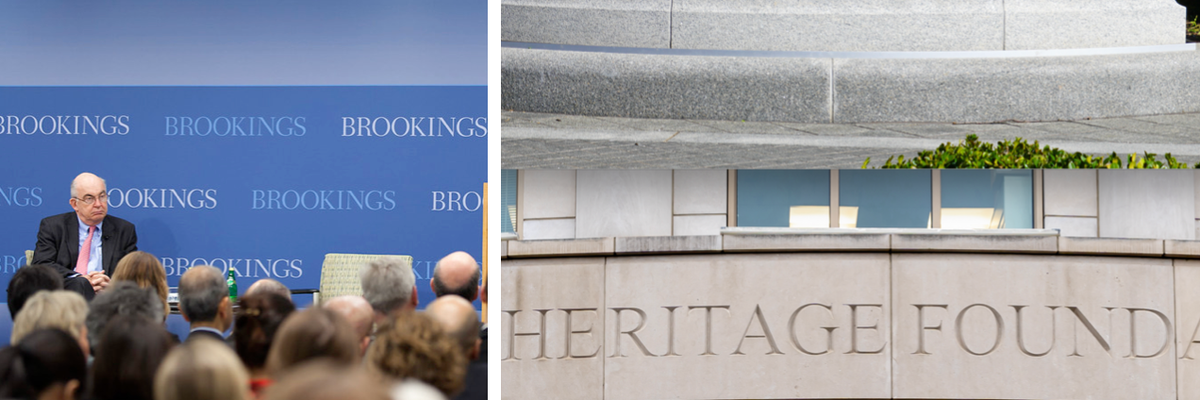Think tanks are suffering from a crisis of public confidence. A 2018 poll showed that just 20 percent of Americans trust what think tanks have to say. And, according to polling just released today, the situation has only gotten worse.
Whether we call it “the death of expertise,” “truth decay,” or simply a new “post-fact” world, the American public’s confidence in all experts, not just those at think tanks, has decreased markedly in recent years. But, that trend appears to be uniquely bad for think tanks. A public opinion poll of American citizens released today by Cast From Clay, the same U.K. firm that conducted the 2018 poll, found that think tank experts are seen even less favorably than most other experts. Just 48 percent of respondents believe “think tankers and public policy experts” are “valuable” to society.
In comparison, the highest scoring experts were medical doctors (82 percent), scientists and engineers (79 percent), and historians (75 percent). While it’s perhaps unsurprising that think tank experts aren’t viewed as favorably as these top groups, think tankers are seen as even less valuable than some of the most assailed groups of experts in America. For example, news reporters and journalists, who seemingly face relentless attacks on their credibility, fared better (55 percent valuable) than think tankers. Even the perennial punching bag of experts, lawyers, were seen by more Americans (60 percent) as valuable to society than think tankers.
“Public lack of trust in policy experts is not unfounded,” Tom Hashemi, Managing Partner at Cast From Clay, explained via email. Stories abound of apparent conflicts of interest at think tanks, most notably the former president of the Brookings Institution facing allegations of working as an unregistered foreign agent. And, it’s precisely this type of situation — where an expert is seen as having ulterior motives — that most concerns the American public.
Other questions in the Cast From Clay poll reveal that the public loses faith in experts with perceived hidden agendas and wants experts to be open and honest about any conflicts of interest they might have. In fact, the number one reason respondents cited for questioning what an expert says is “suspecting the expert may have a hidden agenda,” followed very closely by a “lack of transparency around who is funding the expert.”
Yet, despite notable improvements in funding transparency at many D.C. think tanks, some of the most prominent groups still offer little transparency about their funders. The American Enterprise Institute, for example, is one of the nation’s top think tanks and does not publicly disclose its funders. Though AEI does require scholars to disclose conflicts of interest, the lack of organizational funding transparency is notable, particularly given that its scholars do not shy away from critiquing the donor-driven work of other experts.
Similarly, the Heritage Foundation, arguably the most influential right-leaning think tank in the United States, does not publicly provide information about its donors. Heritage has even gone a step further by opposing donor disclosure on the grounds that it violates, “Americans’ fundamental rights to free political speech, association, and privacy.”
Yet, the public is providing a clear signal that donor disclosure is precisely what it expects from think tanks, and this new polling provides unambiguous guidance about what they can do to increase their credibility and value in the public’s eyes. As Eli Clifton and I recommended in a recent Quincy Institute brief, “Restoring Trust in the Think Tank Sector,” think tanks must be fully transparent about their funding and should proactively identify and avoid the appearance of potential conflicts of interest.
Congress too has taken note of the problems posed by lack of funding transparency and there is growing bipartisan support for a number of long-overdue solutions, like those included in the Fighting Foreign Influence Act that was introduced in the House this summer.
“Non-profit organizations and partisan think tanks play an outsized role in shaping public opinion and influencing policy decisions in the United States," explained Rep. Lance Gooden (R-Texas), one of the bill’s co-sponsors. "We must understand where these groups get their funding, who influences their agenda, and if adversarial nations are using non-profit groups to undermine the United States.”
Think tanks can serve as an important link between academia and the policy community, offering critically important research and ideas to solve the nation's most pressing problems — but only if they’re trusted. To restore the public’s confidence, donor transparency and conflict of interest disclosure and avoidance must become standard operating procedures. It’s the very least that think tanks can do for the American public many claim to serve.
















